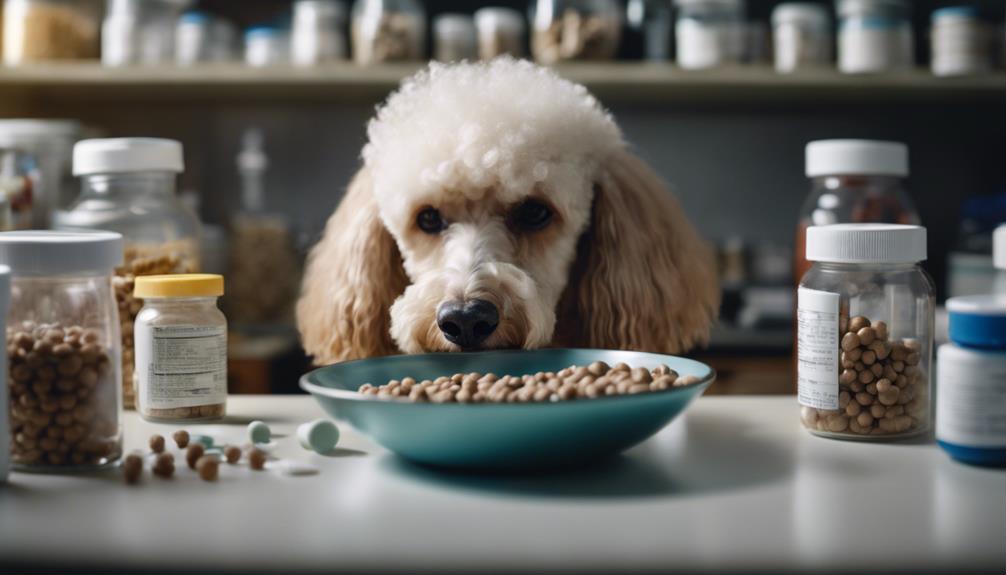When it comes to addressing the nutritional needs of Poodles with health conditions, think of their diet as a tailored prescription, finely tuned to support their unique requirements. Understanding the intricate balance of nutrients essential for their well-being is key. But what about those special dietary considerations that can make all the difference in managing their health issues effectively? Let's explore how specific nutritional adjustments can play a vital role in enhancing the quality of life for your beloved Poodle companion.
Key Takeaways
- Tailoring diets with essential nutrients is crucial for managing health conditions in Poodles.
- Consulting veterinarians for personalized dietary recommendations is essential for Poodles with health issues.
- Implementing specialized diets, supplements, and tailored ingredients supports Poodles' well-being effectively.
- Regular monitoring, prompt adjustments, and collaboration with professionals are vital for optimizing Poodles' nutrition and health.
Specific Nutritional Needs for Poodles

When caring for Poodles with health conditions, tailoring their diets to meet specific nutritional requirements becomes essential. Poodles, like any other breed, may develop health issues such as allergies, joint problems, or digestive sensitivities, all of which can benefit from specialized diets. To address these concerns, consulting a veterinarian is paramount to devise the most suitable nutritional plan for the affected Poodle. Depending on the health condition, supplements like glucosamine for joint health or limited ingredient diets for allergies may be recommended to support the Poodle's well-being.
Regular monitoring of the Poodle's response to the specialized diet is crucial. This monitoring allows for adjustments to be made as needed, ensuring that the dietary regimen effectively manages the health condition. By carefully overseeing the Poodle's progress and making necessary modifications, you can optimize the nutritional support provided, promoting the health and happiness of your furry companion.
Tailoring Diet for Poodle Health Conditions

When tailoring a diet for your Poodle's health condition, you must consider specific dietary restrictions, ensuring a proper balance of essential nutrients to support overall well-being. Consultation with your veterinarian is crucial to determine the most suitable dietary plan tailored to your Poodle's individual health needs. By addressing these points, you can help optimize your Poodle's diet to manage their health condition effectively.
Specific Dietary Restrictions
Tailoring a Poodle's diet for specific health conditions like allergies, diabetes, or kidney disease necessitates implementing precise dietary restrictions based on their individual needs. When addressing these conditions, it is essential to follow these guidelines:
- Eliminating Common Allergens: For Poodles with allergies, removing potential triggers like wheat, corn, soy, and artificial additives from their diet can help alleviate symptoms and improve their overall well-being.
- Low in Carbohydrates: Poodles with diabetes may benefit from a diet that is low in carbohydrates and sugars to effectively manage blood glucose levels and support their health.
- Controlled Phosphorus and Protein Levels: In cases of kidney disease, adjusting the diet to include controlled levels of phosphorus and protein is crucial to maintaining kidney function and promoting overall health.
Proper Nutrient Balance
To effectively address specific health conditions in Poodles, ensuring proper nutrient balance in their diet is crucial for supporting their individual needs and overall well-being. Protein plays a vital role in muscle function and repair, while fats provide essential fatty acids for skin health. Carbohydrates supply energy, and vitamins and minerals are crucial for overall health. Tailoring the nutrient balance for Poodles with health conditions may involve adjusting protein levels to support muscle health, managing fats for weight control, incorporating specific supplements like omega-3 fatty acids for joint issues, and ensuring adequate vitamins and minerals for optimal well-being. Understanding the impact of each nutrient on the body can help in creating a specialized diet plan to manage allergies, obesity, digestive problems, and joint issues effectively.
Consultation With Vet
For tailored dietary guidance specific to your Poodle's health conditions, consulting with a veterinarian is essential. When it comes to optimizing your Poodle's diet for their health conditions, your vet can offer personalized recommendations based on their unique needs. Here's how a vet can assist you:
- Identifying Symptoms: Vets can help identify specific symptoms related to your Poodle's health conditions that may require dietary adjustments.
- Suggesting Ingredient Changes: Your vet may suggest specific ingredients to avoid or include in your Poodle's diet to address their health concerns effectively.
- Ensuring Regular Communication: Maintaining open communication with your vet ensures that your Poodle's nutritional needs are consistently met to support their health conditions.
Dietary Adjustments for Poodles' Health Issues

If your Poodle has health issues, special dietary requirements and tailored nutrition plans might be necessary to address their specific needs effectively. Consider hypoallergenic or grain-free options to alleviate symptoms and support their overall well-being. Consulting with a veterinarian for personalized dietary recommendations is vital for managing your Poodle's health issues efficiently.
Special Dietary Requirements
When addressing health issues in Poodles, it is crucial to implement specialized dietary adjustments tailored to their specific needs and sensitivities. These special dietary requirements play a vital role in maintaining a healthy and happy life for your furry companion. Here are three key considerations to keep in mind: Firstly, it is important to provide a balanced diet that meets their nutritional needs while avoiding common allergens that poodles are prone to. Additionally, referring to a poodle feeding frequency guide can help ensure that meals are properly timed to support optimal digestion and energy levels throughout the day. Regularly consulting with your veterinarian to adjust their diet based on age, weight, and health conditions is also essential for their overall well-being.
- Hypoallergenic Foods: Opting for hypoallergenic food options can help alleviate allergies and skin problems in Poodles with sensitivities.
- Joint Supplements: Including joint supplements in their diet can aid in managing joint issues and promoting better mobility and comfort.
- Limited Ingredient Diets: Limited ingredient diets can be beneficial for Poodles with health conditions, offering a simplified and easily digestible meal option.
Tailored Nutrition Plans
To optimize the health and well-being of Poodles with specific health conditions, implementing tailored nutrition plans is essential. Tailored nutrition plans for Poodles involve customized diets to address issues like allergies, obesity, or digestive problems. Specialized diets, such as limited ingredient formulas or hypoallergenic food, cater to individual Poodle health needs. Adjusting protein, fat, and carbohydrate ratios in the diet can manage conditions like pancreatitis, diabetes, or skin sensitivities in Poodles. Veterinary guidance is crucial when creating these plans to ensure balanced dietary adjustments. Monitoring Poodles' response to dietary changes and making necessary adjustments under professional supervision can significantly improve their overall health outcomes.
| Key Points | Description |
|---|---|
| Customized Diets | Address allergies, obesity, or digestive issues. |
| Specialized Diets | Include hypoallergenic food, weight management programs. |
| Veterinary Guidance | Necessary for balanced and appropriate dietary adjustments. |
Poodle Diet Modifications for Health Concerns

Diet modifications for Poodles with health concerns necessitate tailored nutritional plans to address specific issues effectively. When considering dietary adjustments for your Poodle, it's crucial to focus on their individual health conditions to provide the best care possible. Here are some key points to keep in mind:
- Specialized Diets: Poodles with health issues may benefit from specialized diets such as hypoallergenic foods, which can help manage allergies, or limited ingredient formulas that are gentle on sensitive digestive systems.
- Prescription Diets: In some cases, your veterinarian may recommend prescription diets that are specifically formulated to address certain health conditions like obesity or kidney disease. These diets are designed to provide precise nutrition tailored to your Poodle's needs.
- Consulting with a Veterinarian: Seeking guidance from a veterinarian is essential when determining the most suitable diet modifications for your Poodle. A professional can assess your Poodle's health status and recommend the most appropriate nutritional plan to support their well-being effectively.
Customizing Nutrition for Ailing Poodles

Addressing the specific nutritional needs of ailing Poodles requires tailored plans that focus on managing their health conditions effectively. When customizing nutrition for ailing Poodles, consulting with a veterinarian is crucial to address their specific health issues. Customized diets for these Poodles may involve incorporating specialized ingredients to manage allergies, digestive problems, or chronic illnesses. Adjusting macronutrient ratios, introducing supplements, and monitoring food sensitivities are essential aspects of tailoring their nutrition. Providing proper hydration, offering easily digestible foods, and including joint-supporting nutrients can greatly benefit ailing Poodles. Regularly monitoring symptoms, evaluating the Poodle's health status, and making necessary adjustments to their diet are vital for their overall well-being. By following these tailored nutrition plans, you can help improve the quality of life for your ailing Poodle and better manage their health conditions effectively.
Addressing Poodle Health Conditions Through Diet

When addressing health conditions in Poodles through diet, consider tailoring their meals to meet specific needs. Dietary strategies like incorporating limited ingredient or hypoallergenic foods can help manage allergies effectively. Joint supplements like glucosamine and chondroitin may aid in supporting Poodles with arthritis or joint issues.
Dietary Strategies for Poodles
To effectively manage health conditions in Poodles through diet, tailor their nutritional intake based on specific needs and considerations. When addressing health issues like food allergies, joint problems, or digestive sensitivities, implementing the right dietary strategies can significantly enhance their well-being. Here are three key approaches to consider:
- Incorporate omega-3 fatty acids: These essential fatty acids can support skin health and reduce inflammation, benefiting Poodles with allergies or skin sensitivities.
- Introduce limited ingredient diets: Hypoallergenic or limited ingredient formulas can help alleviate allergic reactions and promote digestive health in sensitive Poodles.
- Include joint supplements: Adding supplements like glucosamine or chondroitin, along with omega-3s, can aid in managing arthritis and joint issues in Poodles effectively.
Tailoring Meals for Poodles
Tailoring Poodle meals for optimal health involves selecting specific ingredients tailored to address their unique dietary requirements. When addressing health conditions in Poodles through diet, it is crucial to consider their specific needs. Consulting with a veterinarian or canine nutritionist can help create a customized meal plan that caters to your Poodle's health conditions. Incorporating ingredients like omega-3 fatty acids, glucosamine, probiotics, and low-allergen proteins can be beneficial for managing various health concerns such as allergies, obesity, joint issues, and digestive problems. Adjusting portion sizes, nutrient ratios, and meal frequency according to your Poodle's requirements can significantly impact their overall health and well-being. By tailoring meals to suit their health conditions, you can support your Poodle's optimal health and quality of life.
Nutritional Strategies for Poodles With Health Problems

Specialized diets tailored to their specific needs are essential for poodles with health conditions, requiring careful consideration and consultation with a veterinarian to ensure optimal nutritional strategies. When addressing the nutritional needs of Poodles with health problems, here are key considerations: It is crucial to factor in their age, weight, activity level, and any underlying medical conditions when formulating an appropriate feeding plan. For instance, the nutritional needs for poodle puppies differ significantly from those of adult or senior poodles, as their growth and development require higher levels of specific nutrients like protein and calcium. Additionally, monitoring any food intolerances or allergies is essential to prevent further complications and ensure overall health. Special attention should be given to the ingredients and nutrient composition to avoid allergens and support any underlying medical conditions. Incorporating homemade dog food recipes for poodles can be a great option, as they allow for precise control over the quality and type of ingredients used. However, these recipes should always be formulated under the guidance of a veterinarian or pet nutritionist to ensure they meet the poodle’s dietary requirements. It is crucial to assess the severity of the health condition and identify any food allergies or sensitivities that might exacerbate the issue. Special diets for active poodles should also account for their energy demands while accommodating any medical requirements to maintain their vitality and overall well-being. Incorporating high-quality ingredients and appropriate supplementation can make a significant difference in managing their health effectively.
- Individualized Meal Plans: Each Poodle with a health condition may have unique dietary requirements. Working closely with a veterinarian can help create a personalized meal plan that addresses specific health concerns while providing essential nutrients.
- Supervised Nutrient Intake: Monitoring the nutrient intake of Poodles with health issues is crucial. This involves tracking the levels of proteins, fats, carbohydrates, vitamins, and minerals consumed to ensure they meet the dog's dietary needs without exacerbating their health condition.
- Regular Diet Adjustments: Health conditions in Poodles can change over time, necessitating adjustments to their diet. Regular consultations with a veterinarian and observation of the dog's response to food can help in modifying the diet as needed to support their overall health and well-being.
Adjusting Poodle Diet for Health Conditions

When adjusting your Poodle's diet for health conditions, it's essential to seek guidance from a veterinarian to tailor the nutritional plan accordingly. Specific issues like allergies, obesity, or digestive concerns may necessitate changes in your Poodle's food regimen. Incorporating specialized dog food formulas or supplements can effectively manage these health conditions in your Poodle.
Dietary Modifications for Poodles
Modifying a Poodle's diet to address specific health conditions often requires adjustments in nutrient composition tailored to their individual needs. When making dietary modifications for Poodles:
- Reducing Specific Nutrients: Adjusting fats for Poodles with pancreatitis or increasing fiber for gastrointestinal issues can help manage these conditions effectively.
- Lower Protein Diets: Poodles with kidney disease may benefit from lower protein diets to reduce strain on the kidneys and alleviate symptoms associated with the condition.
- Hypoallergenic Diets: For Poodles with allergies, hypoallergenic diets that eliminate common allergens like soy, dairy, or grains can help alleviate allergic reactions and improve overall well-being.
Nutrient Considerations for Health
To address health conditions in Poodles, adjusting their diet to meet specific nutrient requirements is essential for optimal management and support. When tailoring a Poodle's diet for health conditions, consider increasing protein intake to support muscle maintenance and overall health. Additionally, reducing fats and carbohydrates can assist in weight management. Supplements like omega-3 fatty acids and joint support products may aid in managing conditions such as arthritis. Monitoring hydration levels and incorporating high-moisture foods are crucial for Poodles with certain health issues. Consulting a veterinarian is key to customizing the Poodle's diet effectively. Below is a table summarizing key nutrient considerations for Poodles with health conditions:
| Nutrient | Role | Examples |
|---|---|---|
| Protein Intake | Muscle maintenance and overall health | Lean meats, fish, eggs |
| Fats | Weight management | Fish oil, flaxseed |
| Carbohydrates | Energy source | Whole grains, fruits |
| Supplements | Support health conditions | Omega-3 fatty acids, glucosamine |
| Hydration Levels | Maintain overall health | Wet food, fresh fruits |
Poodle Nutrition for Specific Health Challenges

For Poodles facing specific health challenges, tailored nutrition plays a crucial role in managing their conditions effectively. When addressing various health issues in Poodles, specific dietary considerations are essential: These dietary plans should be designed to support the unique needs of the breed while helping to alleviate symptoms of their specific health concerns, such as allergies or digestive sensitivities. For instance, incorporating high-quality protein and omega fatty acids can promote a healthy coat and skin, which are common areas of concern for Poodles. By following specialized poodle diet and nutrition tips, owners can ensure their pets receive the proper nutrients to maintain overall health and improve their quality of life. This can include adopting special diets for active Poodles that require higher levels of energy and nutrients to support their dynamic lifestyle. Additionally, Poodles with sensitivities or allergies may benefit from hypoallergenic formulas that minimize triggers and promote overall well-being. Tailored nutrition ensures that every Poodle, regardless of their health challenges or activity levels, can thrive and maintain an optimal quality of life.
- Kidney Issues: Poodles with kidney problems require low phosphorus diets to prevent further complications and support kidney function effectively.
- Allergies: Poodles prone to allergies can benefit from hypoallergenic diets with limited ingredients, helping to alleviate allergic reactions and improve overall well-being.
- Joint Problems: Poodles with joint issues may benefit from diets rich in omega-3 fatty acids. These fatty acids have anti-inflammatory properties that can help reduce inflammation in the joints, promoting better mobility and comfort for your furry friend.
Meeting Poodle Health Needs Through Diet

Adapting your Poodle's diet to meet their specific health needs is essential for ensuring their overall well-being and managing any existing conditions effectively. Tailoring their diet to address Poodle health needs such as allergies, joint issues, or digestive problems can significantly impact their quality of life. Specialized diets, including limited ingredient options, hypoallergenic formulas, or joint health supplements, can help alleviate these specific health concerns. Collaborating with a veterinarian to devise a customized nutrition plan is crucial in addressing Poodle health needs through diet. By incorporating high-quality, easily digestible ingredients and avoiding common allergens, you can support Poodles with sensitive stomachs or skin issues. Monitoring your Poodle's response to dietary changes and making necessary adjustments play a vital role in managing their health conditions effectively. Customizing your Poodle's nutrition plan is a proactive approach to promoting their overall health and well-being.
Diet Adaptations for Ailing Poodles

When catering to the dietary needs of ailing Poodles, specialized diets tailored to their specific health conditions are often crucial. These tailored diets can make a significant difference in managing their health conditions effectively. Here are some key points to consider:
- Prescription Diets: Veterinarians may recommend prescription diets for Poodles with chronic illnesses like heart disease or pancreatitis. These diets are specially formulated to support the management of specific health conditions with precise nutrient levels.
- Adjusting Nutrient Levels: Specific health issues such as kidney disease or diabetes may require adjustments in the nutrient levels of the Poodle's diet. For instance, a low-protein diet might be necessary for kidney issues, while a low-carb diet could benefit Poodles with diabetes.
- Monitoring Food Intake: Regularly monitoring the food intake, hydration, and response to diet changes is essential for ailing Poodles. This monitoring helps in assessing the effectiveness of the specialized diet and making any necessary adjustments promptly.
Poodle Diet for Managing Health Conditions

To effectively manage health conditions in Poodles, implementing a carefully tailored diet regimen is essential. Specialized diets play a crucial role in addressing various health issues such as allergies, joint problems, and digestive concerns. Prescription diets designed for specific conditions like kidney disease or weight management offer targeted nutrition for Poodles. Low-allergen or hypoallergenic diets can help alleviate symptoms related to food sensitivities and skin problems. Additionally, incorporating supplements like fish oil for joint health and probiotics for digestive support can further enhance the management of health conditions in Poodles. Consulting with a veterinarian or canine nutritionist is highly recommended to develop a personalized diet plan that effectively addresses your Poodle's specific health needs.
| Specialized Diets | Health Conditions |
|---|---|
| Prescription Diets | Kidney disease, Weight management |
| Low-Allergen Diets | Allergies, Skin issues |
| Supplements | Joint health, Digestion |
Nutrition Plans for Poodles With Health Issues

Specialized nutrition plans are crucial for addressing the dietary needs of Poodles with health issues. When dealing with health conditions in Poodles, it is essential to consult with a veterinarian to develop a tailored nutrition plan that caters to the specific ailment. Here are key points to consider:
- Identification of Allergies: Poodles with allergies may require diets free from common allergens such as grains or certain proteins. Working with a vet can help pinpoint and eliminate allergens from the Poodle's diet.
- Support for Joint Problems: Poodles suffering from joint problems like arthritis may benefit from diets rich in omega-3 fatty acids and joint supplements like glucosamine. These elements can help reduce inflammation and support joint health.
- Weight Management: Obesity is a prevalent issue in Poodles and can exacerbate other health conditions. Developing a weight management plan tailored to the Poodle's needs, including portion control and appropriate exercise, is crucial for their overall well-being.
Tailored Diets for Poodles With Health Ailments

For Poodles with specific health conditions, tailoring their diets becomes crucial to address their nutritional needs effectively. Tailored diets for Poodles with health conditions such as obesity, allergies, kidney issues, skin allergies, or joint problems require specific nutrient adjustments. Poodles with kidney issues, for instance, may benefit from low-protein diets to reduce strain on their kidneys. Those with skin allergies might find relief with hypoallergenic diets or limited ingredient formulas. Senior Poodles could benefit from diets containing joint supplements like glucosamine and chondroitin to support their mobility. Additionally, Poodles with digestive issues may thrive on easily digestible diets that incorporate probiotics for optimal gut health. By customizing the diet to suit the individual health needs of your Poodle, you can help manage their condition more effectively and improve their overall well-being. Remember to consult with a veterinarian to create a tailored diet plan that meets your Poodle's specific health requirements.
Frequently Asked Questions
What Are the Nutritional Needs of a Poodle?
To meet a poodle's needs, ensure proper protein intake for muscle health, address vitamin deficiencies, monitor carbohydrate levels, provide adequate fiber for digestion, maintain optimal fat content, consider mineral supplements, and promote hydration.
What Is the Best Diet for a Poodle?
To give your Poodle the best diet, consider protein sources, grain-free options, weight management, homemade meals, senior adjustments, allergies, and supplements. Consult experts for a tailored plan. Watch for changes to optimize health.
Do Poodles Need a Special Diet?
You need a special diet if your poodle has health conditions. Consult a vet to create a meal plan tailored to their needs. Consider dietary restrictions, weight management, nutrient deficiencies, and digestive health. Address allergies and sensitivities for optimal health.
What Health Issues Are Poodles Prone To?
Poodles are prone to various health issues such as hip dysplasia, patellar luxation, allergies, epilepsy, and more. Genetic predispositions, environmental factors, regular vet visits, tailored nutrition, and early detection can aid in prevention, treatment, and long-term management of these conditions.
Conclusion
In the intricate dance of nutrition and health, remember that your Poodle's well-being hinges on a carefully crafted diet. Just as a skilled conductor orchestrates a symphony, your veterinarian can guide you in harmonizing the right nutrients for your furry companion's specific needs. Embrace the role of a diligent caregiver, fine-tuning their diet like a maestro perfecting a masterpiece, to ensure your Poodle thrives in optimal health.
